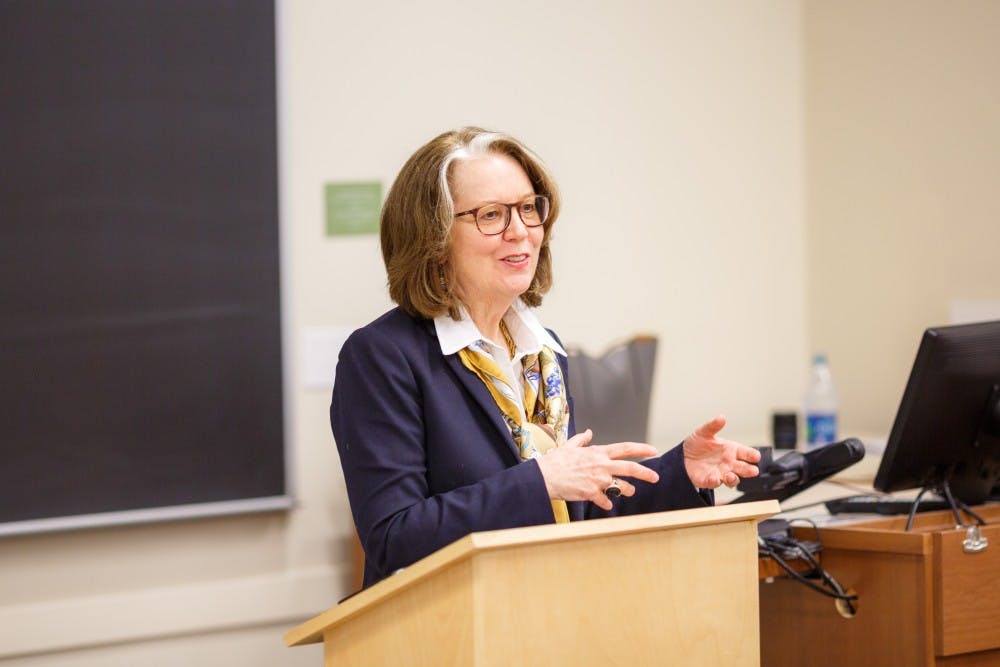Author Patricia Hampl delivered a guest lecture last Tuesday about her new book, “The Art of the Wasted Day.” Hampl is an English professor at the University of Minnesota, where she teaches creative writing. Forty-five people gathered in a classroom in Nau Hall to hear her speak.
Hampl was the guest of Religious Studies Prof. Charles Marsh and the Project on Lived Theology, a research initiative that explores the social consequences of theological commitments.
Marsh, the director of the Project on Lived Theology, began by welcoming the lecture’s guests. The audience included students from a Religious Studies class Marsh teaches.
“For those of you who are coming today for this open public discussion, you might want to know that you are joining a class called God and the Mystery of the World,” Marsh said. “With a title so ambitious and open-ended, it’s an opportunity to bring a group of 25 talented students together and read books in religion and experience that have shaped me and, I hope, in turn, will inspire my students.”
Marsh praised Hampl’s book, which he assigned his class to read.
“‘The Art of the Wasted Day,’ in so many profound ways, brings to some kind of lovely synthesis the conversations and explorations of the semester,” Marsh said.
“The Art of the Wasted Day” is a memoir that explores Hampl’s lifelong interest in the value of leisure and daydream, which she began writing several years ago with the encouragement of the Project for Lived Theology.
Hampl then began her lecture by thanking Marsh and the Project for commissioning her to write the book.
“This book actually got its start quite some time ago because of the Project on Lived Theology and a phone call I got from Charles,” Hampl said.
Later, she elaborated on how the Project for Lived Theology gave her the start for “The Art of the Wasted Day.”
“There were five of us, I believe, each of us invited to write a book of our own choosing that somehow engaged our work; in my case, as a memoirist,” Hampl said. “My kind of writing, because it’s not scholarship, needs to have a quality of lyric presence and narrative.”
Hampl spoke about the influence that her husband’s death had on her writing.
“I’ve heard novelists talk about a character taking over their book, but I never had that experience,” Hampl said. “But in this book, there’s a scene early in the book in which I’m describing something happening on an airplane, and my husband takes my hand. I only did that for narrative purposes, but it’s almost like once his hand came in, the rest of him came in too.”
Hampl then delved into her experience in the field of memoir-writing. She shared her observation that memoir, as a genre, is often criticised for being self-absorbed or self-indulgent, but Hampl disagreed.
“I just want to throw those ideas out about the memoir and the curious way it gets rapped on the knuckles for being self-absorbed,” Hampl said. “When you speak out of your own experience, you are the only authority.”
She also said that memoirs, or first-person nonfiction narratives, reveal aspects of the human condition that don’t come through in other forms of nonfiction or in fictional novels.
“The rise of the memoir has an incredible position in religious writing, too,” Hampl said. “There’s something inevitably religious about these first-person narrations ... One of the things that’s interesting about personally voiced nonfiction is that in these documents we bring forth a part of culture that seems to have gone away from the novel.”
A question-and-answer period followed Hampl’s talk.
Jessie Duska, a visiting graduate and a student in Marsh’s class, asked Hampl how she came up with the title. Hampl could not recall exactly where the title came from, but she said that it was meant to grab the reader’s attention.
“I can’t remember if it was in conversation with my agent … but of course the reason I like it and the reason it has some juice in it is because I’m playing against that very thing — the art of something that’s wrong?” Hampl responded. “The art of wasting a day? It’s meant to provoke.”
Marsh also had a question for Hampl, whom he described as one of his literary heroes.
“This beautiful place to which you and your writing summon us is the opposite of the success-driven place we live,” Marsh said. “How do we learn to inhabit this space?”
Hampl responded that she had written the memoir in exploration of that question.
“That’s why I wrote this book,” Hampl said. “I’m playing with our use of how-to books with this title ... Sometimes the thing to do is just pause. We aren’t big pausers around here. To me, that’s what this is about.”
Hampl said that she wanted students to take away from her lecture a greater appreciation for the first-person nonfiction style of writing.
“I hope that they feel a kind of confidence in using their own first person voice in their writing and thinking, that they feel both a responsibility to be somebody who can do that and also that they feel free to do that,” Hampl said. “Again, it isn’t just about talking about yourself. That’s not what I’m encouraging. I’m encouraging using yourself, your consciousness, to think about the world before us and to speak from that point of view, which I think is important.”







